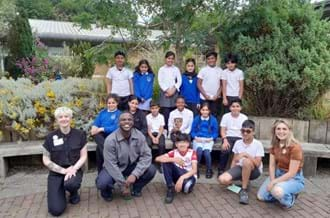5 ways to support your child to make friends
5 ways to support your child to make friends

Judah Racham
Programme Leader for Family Work - Judah is a BACP registered counsellor, and Parent-training Mentor, who joined Place2Be in 2021. He has over 7 years experience delivering counselling and therapeutic services for adults and children. Judah has been supporting parents and carers, delivering parent training and supervising parenting practitioners within local authorities and the NHS for over 17 years.
This year’s Children’s Mental Health Week theme is Let’s Connect, and we’re encouraging people to make healthy, rewarding, and meaningful connections. We share some tips on how to support with children with friendships.
New Place2Be data, released today, shows that nearly 78% of the young people we supported last year have felt socially anxious.
As a parent or carer, you can play an important role in supporting your child with social interactions and establishing healthy friendships. Place2Be’s Programme Leader for Family Work, Judah Racham, has shared some tips below.
Work together to grow their friendship skills
Talk to your child about what makes a good friend, and practice friendship skills such as listening, sharing, compromising, and negotiating.
Sit together and explore examples in everyday life and from TV and books. This will help your child think about what makes a good friend and feel less worried about friendship issues. You can also encourage friendships beyond school, like joining clubs or arranging play dates.
Help them to gain confidence
If your child is shy, this can make it feel more difficult to make and keep friends. Give your child lots of opportunities to connect and communicate with you in whatever ways you feel comfortable for them. Practising with you will give them more confidence to connect with others.
Have one-to-one play-dates to give your child a chance to practise social skills and deepen friendships without being in a crowd. If you base play-dates around activities your child enjoys, this can help your child overcome the initial struggle to engage.
Model positive and healthy relationships
Happy relationships between parents and significant adults lead to better mental and physical health for all involved. Children thrive emotionally when they see and are involved in warm and caring relationships where they are respected and valued.
By modelling positive relationships of your own, you can help your child to see what positive, healthy and meaningful relationships should look like – and to recognise when friendships aren’t positive.
Reassure them that it’s natural for friends to fall out sometimes
Children’s friendships often change and can look different depending on your child’s age and stage of development. While having friends at school is important, it is perfectly ordinary for your child to have difficulties with their friendships.
Let your child know that being friends doesn’t always mean agreeing or getting along with others all the time.
Talk the talk
Sometimes children can find it difficult to know how what they can say when talking with their peers. You can help your child by practicing what they can say to introduce themselves to someone new or to make a new friend. Sometimes this involves them learning to ask a question or invite another child to play with them. Help children to think of questions they can use to make connections with friends, such as:
- Would you like to play football or something else during break?
- Can I sit next to you in class?
- Do you want to play catch?
Other resources you may find useful:
News & blogs

The Young BAFTA Roadshow with Place2Be arrives in Birmingham
Read the press release of the Young BAFTA Roadshow visit with Place2Be at Birmingham.
Read more
The Young BAFTA Roadshow with Place2Be arrives in Oldham, Manchester
Read the press release of the Young BAFTA Roadshow's visit with Place2e at Oldham, Manchester.
Read more
The Young BAFTA Roadshow with Place2Be arrives in Enfield
The Young BAFTA Roadshow with Place2Be arrives in Enfield on 1 July 2025.
Read more



